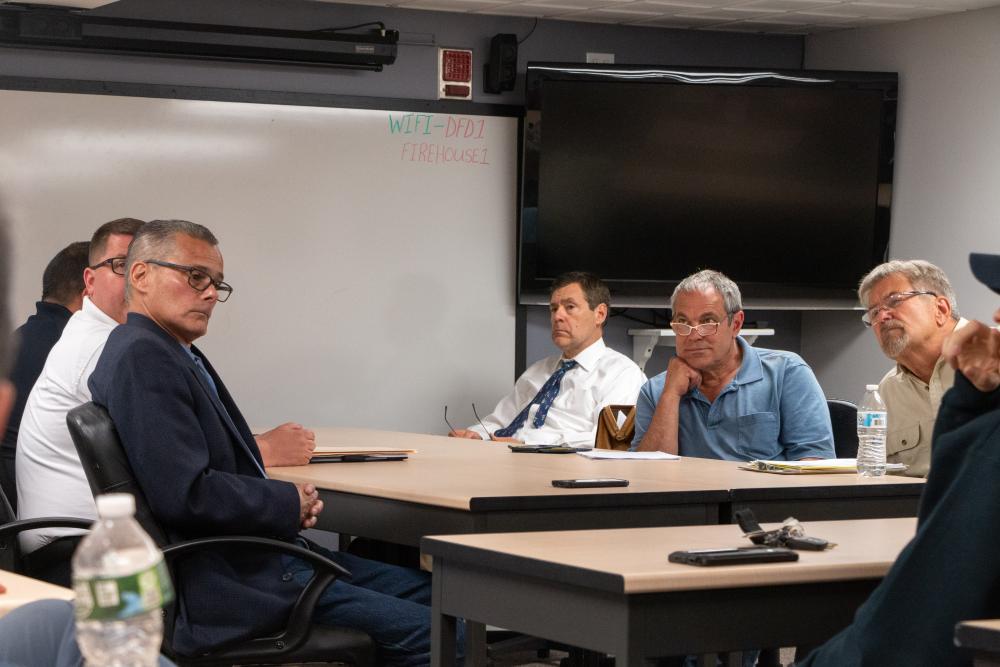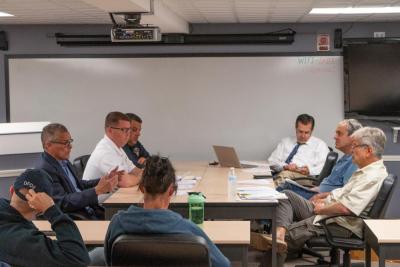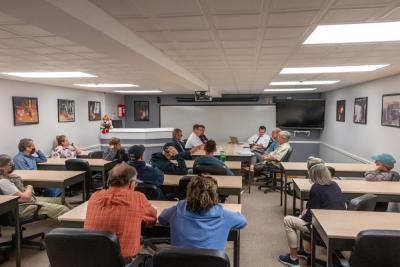Fire Chief’s extension at risk amid contract dispute
The contract extension of District 2 Interim Fire Chief Greg Edgcomb may be in jeopardy.
At a heated Prudential Committee meeting on May 24, newly-elected members said they were blindsided by an already-signed contract that they, along with the district’s counsel, ultimately deemed void.
The argument began when Edgcomb surprised newly-elected Prudential Committee members Bob Bouley and Bill Coutu by announcing that his contract had already been extended by the outgoing members at an April 11 meeting — the last before the new committee members were elected on April 26.
Edgcomb has acted as interim chief since this past December when he was tapped for the position shortly after the resignation of former chief Timothy Andre.
Edgcomb said that he realized during the district’s annual meeting that the Prudential Committee was not aware of the contract based on their responses to voters’ questions, but didn’t want to spring the news on them in front of a crowd of people.
He added that he would have clarified the situation prior to the meeting if the new committee members had met with him between their election and the annual meeting.
“You could have come by anytime to ask how the fire department works,” he said. “I’ve been here 26 years and I’ve never seen you at any of our meetings.”
The interim chief also implied that the new committee members did not want him to be made chief at all for reasons unrelated to his performance.
“Clearly you have a problem with me running the department,” he said.
Bouley responded that the issue was not with Edgcomb’s performance, but the cost of paying him.
“The question is, can I afford it?” he said. “I’m representing people on fixed incomes and we can’t afford it.”
Edgcomb was set to make $115,000 a year based on the contract, an amount that was approved by district meeting voters on May 9.
The salary represents a raise of about $7,000 a year compared to what the former chief would have made this year based on his pay schedule, Deputy Chief Wayne Thomas said.
Bouley also expressed his displeasure at not having been informed ahead of the annual meeting that the contract was already signed.
“I thought we were gonna be able to talk about this at length,” he said. “Now it feels like it’s being dropped on us.”
But district counsel Anthony Savastano interrupted the argument to inform both parties that the signing of Edgcomb’s contract had not been listed on the agenda for the April 11 meeting and thus had violated Massachusetts open meeting laws, rendering the document void.
After the announcement was made, the discussion got more incendiary as Coutu accused Edgcomb of being “very misleading” when describing certain budget items to district meeting voters.
Coutu also asserted that he had wanted to advertise the chief position outside the department to “see if someone else wanted to do it.”
Soon after, Coutu and Bouley voted to send the meeting into executive session — which is closed to the public — to discuss contract negotiation strategy.
When the meeting returned to regular session, Coutu and Bouley said they would need more time to consider Edgcomb’s contract, but agreed to open the meeting to public comment from the 15-or-so attendees, many of whom were firefighters or former Prudential Committee members.
Each who spoke gave nothing but positive feedback over the new chief’s performance.
Firefighter Eric Abrantes emphasized the importance of being able to trust his fire chief with his life, especially at a department staffed mostly by call firefighters.
“We don’t get paid much to do this; morale is everything — morale is how we get paid,” he said. “If I’m running into a burning building, I have to trust the guy that’s sending me in there. I trust [Edgcomb].”
Former Prudential Committee Member Bernard Giroux said that since Edgcomb took control of the department on an interim basis, the number of call firefighters at the department rose from eight to 18, a change he attributed to an improvement in morale.
Giroux — who was replaced on the committee by Bouley in April — also noted that when the committee had gone to the Bristol County Chiefs’ Association last year requesting to interview outside candidates, they had been quoted a price of $8,000 per candidate.
The association disputes Grioux’ claim.
“The Chief’s Association has never done that in the past, nor have we ever charged for any kind of service like providing candidates,” Association President Chris Maguy said.
He added that he asked fellow members on Thursday if they were aware of providing any recent quotes, but none were aware of that occurring.
“Nobody knows what that gentleman’s talking about,” Maguy said.
Another speaker referenced a $40,000 grant that had been awarded to the department after Edgcomb applied for it.
Ralph Medeiros, the only current member who was on the Prudential Committee prior to the April election, responded that he had never been worried about paying Edgcomb a higher salary than the former chief.
The two other committee members concluded that their issues were mainly with the way the situation had played out and their lack of familiarity with Edgcomb, despite his 26-year history with the department.
“I don’t have anything negative to say about him,” Coutu said. “But, I don’t want to be handed a contract and be told that it’s already signed.”
“I have no problem with the chief,” said Bouley. “I really don’t know him.”
No final decision was made on Edgcomb’s contract at the meeting.
This story was updated to include comment from the Bristol County Chiefs’ Association.














